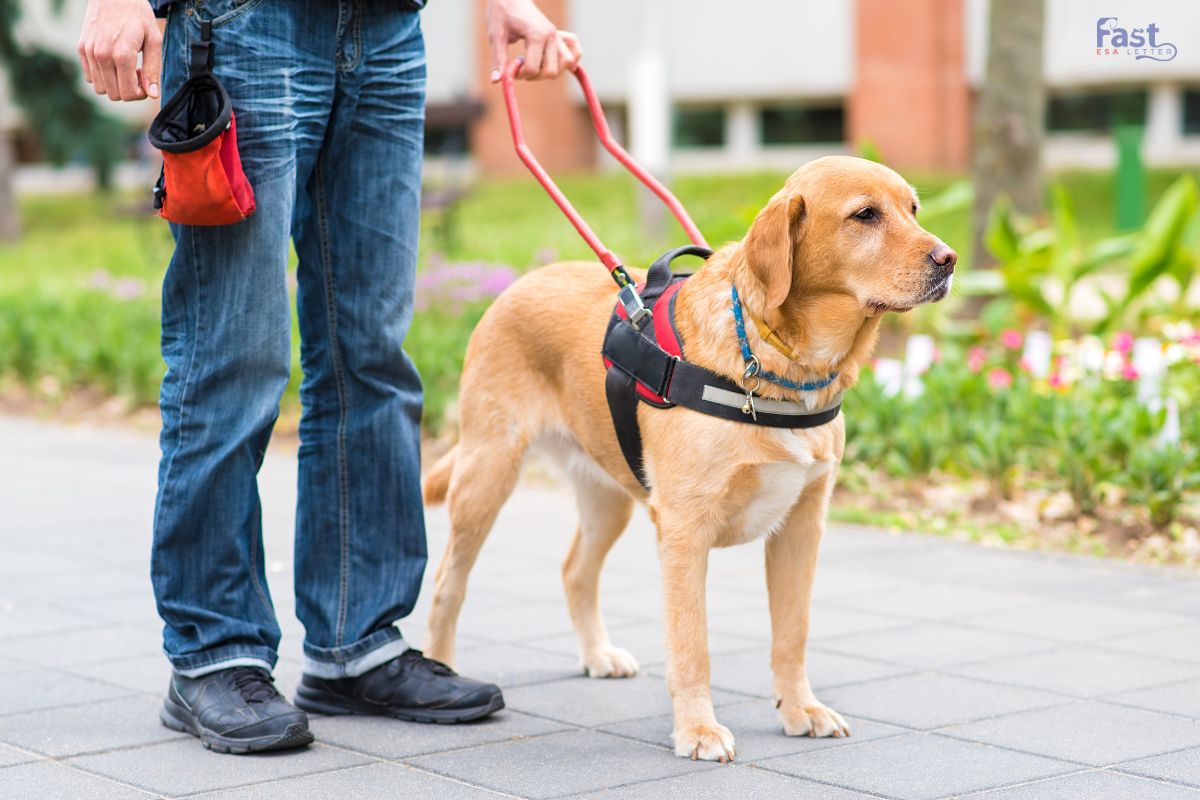How to Get a Psychiatric Service Dog in Arizona?
Psychiatric service dogs are life-changing assets for thousands of people in Arizona, and obtaining one is not as daunting as it may seem. In fact, the entire process is straightforward and can be completed online. All you need is a PSD letter from a licensed mental health professional.
In this guide, we will cover everything you need to know about acquiring a psychiatric service dog in Arizona. From understanding eligibility requirements to navigating state laws and selecting the right dog, we will guide you through each step.

Key Points
- To get a psychiatric service dog in Arizona, you need to obtain a PSD letter from a licensed mental healthcare professional.
- You can obtain this letter through either an online or in-person visit.
- You must have a disability that limits your daily activities to qualify for a service dog letter in Arizona.
- Your dog must be trained to become a psychiatric service dog.
- The dog must be trained to perform tasks related to your disability.
- Your service dog in Arizona is protected under several federal laws, such as the FHA, ADA, and ACAA.
- These laws grant you and your service dog the right to live, fly, and access public spaces.
How is a Psychiatric Service Dog Letter Defined?
What Are the Eligibility Criteria for a Psychiatric Service Dog in Arizona?
- Autism
- Agoraphobia
- Claustrophobia
- Anxiety Disorders
- Bipolar Disorder
- Post-Traumatic Stress Disorder (PTSD)
- Obsessive-Compulsive Disorder (OCD)
- Depression
- Attention-Deficit/Hyperactivity Disorder (ADHD)
- Schizophrenia
- Panic Attacks
- Phobias
Does My Dog Need Training to Be Certified as a Psychiatric Service Dog in Arizona?
1. Hire a Full-Time Professional Trainer
2. Self-Training
Training your dog yourself is a more cost-effective option but can be time-consuming and challenging. If you’re willing to dedicate significant time and effort, self-training is an option. However, it requires a strong commitment to consistency and patience. Thorough research into the specific tasks your dog must learn is essential for success.
3. Adopting a Trained Psychiatric Service Dog
Where Can I Find a Trained Dog For a Psychiatric Service Role in Arizona?
- Arizona Animal Welfare League (Phoenix, AZ)
- Friends For Life Animal Rescue (Gilbert, AZ)
- Halo Animal Rescue (Phoenix, AZ)
How to Select the Best Dog Breed for a Service Dog Role?
1. Consider Your Needs
2. Study Their Temperament
3. Evaluate Their Energy Levels
4. Understand Their Training Strength
5. Consider Their Physical Attributes
6. Evaluate The Breed’s Health and Lifespan
7. Don’t Forget To Seek Professional Guidance
The Process of Getting a Psychiatric Service Dog in Arizona
- Schedule an Appointment
The first step in getting a psychiatric service dog is to book an appointment with a licensed mental health professional, such as a therapist, psychologist, or psychiatrist. - Consult with a Licensed Mental Health Professional
During the consultation, the mental health professional will assess your condition and determine if a psychiatric service dog can assist in managing your symptoms. - Train Your Psychiatric Service Dog
The next step is ensuring your dog is properly trained to assist with your specific psychiatric needs. The training must focus on teaching your dog tasks directly related to your mental health. - Obtain Your PSD Letter
If the professional concludes that a psychiatric service dog would be beneficial for your condition, they will provide you with a PSD letter.
Do I Need To Register My Psychiatric Service Dog With Any Government Database in Arizona?
There is no federal requirement to register your PSD with any government database. Moreover, there is also no service dog certification required in Arizona. Many websites offer service dog registration services for a fee, but these are not legally required or recognized by federal law. You only need a PSD letter from a licensed mental health professional to confirm your need for a psychiatric service dog. This letter is sufficient for accessing the rights and accommodations provided under federal laws like the Americans with Disabilities Act (ADA).
What is the Cost of Getting a Psychiatric Service Dog in Arizona?
Laws and Regulations for Psychiatric Service Dogs in Arizona
1. Air Carrier Access Act (ACAA)
The ACAA allows you to travel with your psychiatric service dog without being denied access or charged extra fees. To ensure smooth travel, airlines may require you to submit documentation before departure, so having all necessary paperwork on hand is crucial. This rule applies to all flights of U.S. airlines and flights to or from the United States by foreign airlines.
However, it’s a good idea to contact the airline in advance to know their specific documentation requirements. Most airlines require the U.S. DOT Service Animal Air Transportation Form and the Animal Self-Relief Form. If you are traveling from a high-risk rabies country, you may need to submit vaccination records and additional documentation.
2. Americans with Disabilities Act (ADA)
Under the ADA, state and local governments, offices, nonprofit organizations, and businesses that serve the public must allow psychiatric service dogs to accompany you. Moreover, service animals are allowed even in places that don’t allow pets and emotional support animals. For example, service dogs can enter:
- Restaurants
- Shops
- Hospitals
- Schools
- Hotels
Example: A retail store with a “no pets” policy must allow entry to a man with his psychiatric service dog. The store staff cannot deny him entry or ask him to leave his dog outside because it is a service dog.
3. The Fair Housing Act (FHA)
- Rental properties with four or fewer units where the landlord lives in one of the units.
- Single-family homes rented or sold by the owner without using a real estate agent.
- Housing provided by religious groups or private clubs that limit occupancy to their members.
4. Equal Employment Opportunity for Individuals with Disabilities
Is Wearing a Vest Compulsory for Service Dogs In AZ?
Wearing a vest is not legally required for service dogs. While it is the dog owner’s choice, a vest can help identify the dog as a service animal, making it easier for the public and businesses to understand its role. Using a vest can facilitate smoother interactions and reduce misunderstandings, but ultimately, the decision rests with the service dog owner.
Final Thoughts
Getting a psychiatric service dog is straightforward in Arizona. You need to obtain a PSD letter from a licensed healthcare professional, such as a psychiatrist, psychologist, or therapist. They will assess your condition and determine the need for a service dog. Once approved, you will receive your PSD letter. Note that your service dog must be trained to perform tasks related to your disability, so you may either train your dog yourself or adopt a trained dog. Besides the PSD letter, there is no requirement to decorate your service dog with a vest, leash, or collar. These are optional and up to your personal preference.
Frequently Asked Questions (FAQs)
What Tasks Can A Psychiatric Service Dog Perform?
- Alerting you to anxiety attacks
- Providing grounding during episodes of distress
- Reminding you to take medication
- Creating physical space in public, and more
Can Any Dog Breed Be A Psychiatric Service Dog?
What Are The Responsibilities Of A PSD Handler?
How Long Does The Process Of Obtaining And Training A PSD Take?
What Is The Validity Of A PSD Letter In Arizona?
Who Can Write A PSD Letter In Arizona?
Post Author
Patricia Thompson
Related Articles
Man With Schizophrenia Manages Symptoms With The Help Of A Psychiatric Service Dog
How PSD Helps Manage Symptoms of Schizophrenia?A Psychiatric Service Dog helps manage schizophrenia symptoms by providing emotional support, grounding the individual during hallucinations, and assisting in crisis situations. PSDs offer stability...
Why Do You Need a Psychiatric Service Dog ID Card?
Why Do You Need a Psychiatric Service Dog ID Card?A psychiatrist service dog ID card is not required by the ADA, but it can be helpful in communicating to others that your dog is a trained service animal. A PSD Letter makes it possible.In...
Anxiety and Psychiatric Service Dogs: What You Need To Know.
How Psychiatric Service Dogs Help Manage Anxiety: A Complete GuidePsychiatric service dogs help manage anxiety by providing emotional support and performing specific tasks tailored to their handler's needs. They can detect early signs of anxiety,...
Live and Fly Free with Your PSD!






